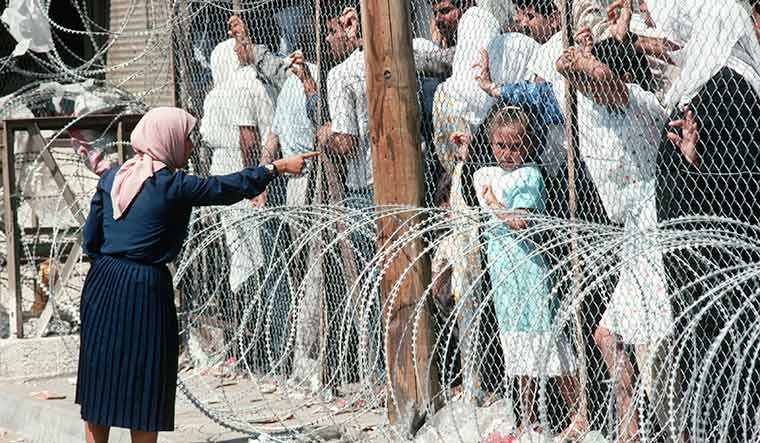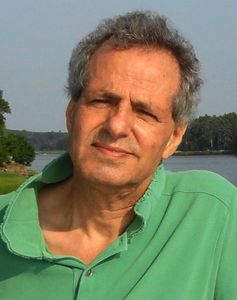In order to retain ownership over my distant sky,
I must not own even my very skin.
―Mahmoud Darwish
A Soldier Dreams of White Lilies
IT IS LATE evening in Boston. Far away in Gaza, it is yet another dark night, after another day of nonstop Israeli attacks. Palestinian-American poet Sharif S. Elmusa says what is happening in his homeland is the continuation of the long struggle that started with the British colonial regime taking over Palestine. For him, it is almost like watching a rerun of history.
“Britain helped settle [the Jewish people] in Palestine, and it suppressed all our hopes,” says Elmusa. “We revolted in 1936, before India [became independent]. We were very small people, there was just about a million of us. The British sent 20,000 troops from Europe to crush them. They almost left because of our resistance. But we lost eventually, like everyone else. We are the last people who are not freed from colonialism.”
But it is a battle that is far from over. And there are no winners.
In his essay “Portable Absence: My Camp Remembered”, Elmusa writes that Britain sends expats to other lands, India immigrants, and Palestine exiles. It is in this exile that he continues to remember, and refuses erasure. “It is the dispossession of everything,’’ he says. “Once you lose your country, apart from the material losses, the house, the land and everything, you also lose your historical memory. You are cut off.” That is what Israel is doing to Palestine, he says. “Israel tries to redraw everything. It is the biggest archaeological site in the world. Everyone there is an amateur archaeologist, trying to redraw everything. And our history is being wiped out.”
Elmusa, 76, spent his whole life searching for home. As Palestinian poet Mahmoud Darwish writes, “I have learned and dismantled all the words in order to draw from them a single word: Home.” Elmusa would know. He grew up in a refugee camp, which he says looked like a version of the streets in American cities. He realised it when he first went to New York. “I understood that the camp is really a modern contraption. It was like the well-organised streets in an American city. The UN used to come every month, and gave people food and stuff. That was the most humiliating thing for my father, and for us.” He stopped going as soon as he grew up.
In a piece he wrote for the Indian Quarterly, Elmusa talks about an opportunity he got to work in Gaza with the United Nations Development Programme and telling his father about the assignment. “[My father], who always praised the last meal he ate as the best, singled out the guavas of Khan Younis as the most delicious guavas he ever had. He was living in Amman, Jordan, at the time where the Elmusas ended up after the 1967 war, during which Israel occupied the rest of Palestine. Fortunately, late summer and early fall is the time when guavas ripen; and I was delighted to be able to send him a whiff of a taste that had lodged itself so deeply in the recesses of his palette, and to have him enjoy for a moment a palpable connection to a land he never again could step into after 1948.”
Elmusa once got a chance to return to the site of the camp in the West Bank where he grew up, the only home he says he knew, even if it was not real. He found that it was all gone, erased. “All had been melted into dusty air.... The houses were all gone. Their whitewashed mud brick walls did not purr when we lived in them, and perhaps had already looked like ruins to outsiders, but they sheltered the private pleasures and agonies of many families, and stood as testimony and symbol of our expulsion in 1948. Now they were not even rubble that one could gaze at and try to reconstruct in the mind’s eye, or reanimate with the lives that once filled them.”
For Palestinians, the erasure was brutal. It was systematic, savage, relentless and complete. And yet, it is constantly denied. “When people were first driven out, they thought they would go back, because most refugees think they would go back,’’ says Elmusa. “This is why Israel destroyed our villages, so that we forget about the idea of returning.”
And to erase the past, even the landscape was changed. The olive tree―quite the symbol of Palestine―was replaced by the pine. Elmusa spent much of his life trying to create biographies of these erased villages, like obituaries to remind people that they existed. “But nature is stronger than we are. The Israelis wanted to make an Israeli landscape because they came from Europe. They had all these pines. They thought it will bring rain to the region, because Europe has this rainfall. But the pines turned out to be a fire hazard. And they accuse the Palestinians of starting the fires.’’
Writing is a form of protest for the Palestinians, but it is also a resistance against erasure. Keeping alive the memory of the past at a time when Israel is trying to rewrite history to wipe out Palestinian claims to the land through reinterpreting archaeology is political as well as personal for the Palestinians. A poem is perhaps “the silence in which the stranger wraps himself to preserve memory, to resist the gravity of the new abode.” It is survival.
And so in the poem “We Never Left”, Palestinian-American writer Susan Abulhawa says, “We persist. We exist. We are one nation, one history, one heritage, one people. Determined and destined to go home.”
Elmusa believes that the only way forward is to accept that. “What I know and what I would like to see is whether Israel will finally realise that it cannot live by the sword. That they have to come to accommodation with the Palestinians and stop this for everybody,’’ he says. “It will destroy everything. It has destroyed us. But they also have been brutalised. The people who were put into concentration camps are putting other people in concentration camps and killing them.”



